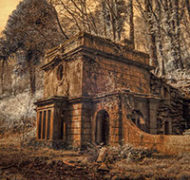Books on Faith: The Sabbath World by Judith Shulevitz
Blog / Produced by The High Calling
In the introduction to her book The Sabbath World: Glimpses of a Different Order of Time, Judith Shulevitz says of the Conservative synagogue in San Juan she attended as a child, “…The building, a ruined mansion starting to crumble, smelled of wood rot. It had termites. The specks of wood they had chewed and shat out would fall from the tops of the prayer books in a fine spray of golden dust when you pulled them off their shelves.”
As I read her words, it struck me that this “ruined mansion” might be a fitting metaphor for Sabbath-keeping in our culture today. If not letting this tradition crumble, in Shulevitz’s words, at best, we Americans are ambivalent to observing the Sabbath.
It is my theory that these ambivalences can be traced in some way to the Christian ambivalence toward the idea of living a life in thrall to law and tradition, which can be traced in some way to an even deeper ambivalence toward ritual, which can be traced in some way to the most profound possible qualms about holiness, an uncanny, spectral quality that forces itself upon us from its perch in the past.
Shulevitz is Jewish, but she admits her family did not think of themselves as religious. Growing up, she did not follow the strict religiosity that Jewish tradition holds. That includes dietary restrictions as well as by-the-book Sabbath-keeping, among other things. “Religiosity,” she says, “to us was obsessive-compulsive, masochistic, intellectually narrow, irrational, tribalistic, antimodern. Living the religious life, especially the Jewish religious life, means making a commitment to live by rules that are neither logical nor natural.”
And yet, ten years ago, Shulevitz developed what she calls a passionate interest in studying the Sabbath. And while she initially told herself her interest was purely intellectual in nature, she knew it went much deeper. After all, the author says, at the core of the Sabbath is an unassuageable longing.
Isn’t it this longing we seek to fill when, as the author says, “…we pine for escape from the rat race; when we check into spas, yoga centers, encounter weekends, spiritual retreats; when we deplore the increase in time devoted to consumption; when we complain about the commercialization of leisure, which turns fun into work and requires military-scale budgeting and logistics and interactions with service personnel…”
We seek to give this broken-down mansion a new coat of paint...when what it really needs is a rebuild from the ground up.
This is what Judith Shulevitz attempts to do in The Sabbath World: Glimpses of a Different Order of Time—give us a deeper understanding of this age-old tradition. She takes us deep into the roots of Sabbath, looks at the architecture of time, explores the thoughts of scholars, scientists, and poets on the matter, and shares her own personal struggles with keeping Sabbath.
Will you join us on Mondays in July as we consider how we order our days? As we read through The Sabbath World together, we would love to hear from you about what Sabbath means to you, what influences you in your practice of Sabbath-keeping, and if you have noticed an impact Sabbath-keeping has on the hard work of living your life. If we cannot rebuild, perhaps together we might arrive at a new way of seeing this crumbling mansion. Leave your thoughts in the comments, and if you are reading and blogging along, drop your link there, too. Next week, Shelly Miller leads us in discussing parts one (Time Sickness) and two (Group Dynamics).
Image by Kristofer Williams. Used with permission. Sourced via Flickr. Post by Laura J. Boggess.




